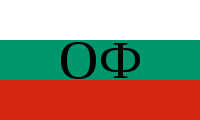Fatherland Front (Bulgaria)

The Fatherland Front (OF) [Otečestven Front] (Bulgarian: Отечествен фронт, ОФ) was originally a Bulgarian political resistance movement during World War II. The Zveno movement, the communist Bulgarian Workers Party, a wing of the Bulgarian Agrarian National Union and the Bulgarian Social Democratic Workers Party, were all part of the OF. The constituent groups of the OF had widely contrasting ideologies and had only united in face of the pro-German, militarist dictatorship in Bulgaria. Still, initially the members of the OF worked together, without a single dominating group. However, the Bulgarian Communist Party began to dominate soon. In 1944, after the Soviet Union had declared war on Bulgaria, the OF committed a coup d'état and they declared war on Germany and the other Axis nations. The OF government, headed by Kimon Georgiev (Zveno), immediately signed a ceasefire treaty with the Soviet Union.
On November 18, 1945, it won a large majority after being the only party or alliance listed on the ballot.[1] In 1946 Georgiev resigned and his successor was Georgi Dimitrov, leader of the Communist Party, and Bulgaria became a People's Republic. It eventually transformed into a wide-ranging popular front under overall Communist control, and all member parties except the Bulgarian Agrarian People's Union dissolved. With the end of Communism in 1989 it was dissolved. One of the former Chairmen of the National Council was Encho Staikov. Pencho Kubadinski was Chairman of the National Council 1974–1989.